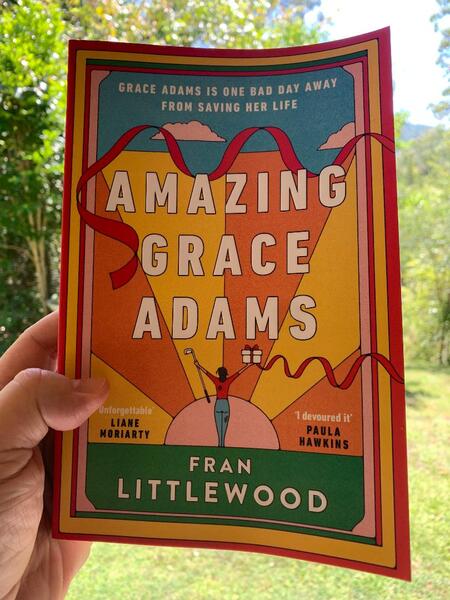
Can one day change everything?
If you’re Amazing Grace Adams by Fran Littlewood, it can and it does, with less than 24 hours in fact bringing about a messy kind of Road to Damascus moment for the titular character who finally confronts the one issue that ended up splintering her once tight family into what appear to be irretrievably broken pieces.
As Grace loses everything one by one – her husband, who’s divorcing her, her sixteen-year-old daughter who’s caught in a world of acting-out pain, and her livelihood, the once indisputably amazing protagonist has to grapple with the pain and loss that has robbed her and her family that once made them so special.
In chapters that move between a detailed, painful and sometimes funny recounting of the searing events of the day in north London which makes up the main narrative of what is the author’s debut book, and those that detail a past, both glowingly promising and deterioratingly awful, we come to understand in ways that will break your heart and have you sighing in rich understanding, what it is to come to the end of yourself and how one day, one breaking point day, can bring everything to an epiphanic place where you finally face up the lurking demons you’ve long ignored.
Inspired, says the author, by the 1993 film Falling Down where Michael Douglas’s character reaches the absolute end of his tolerance for all of the hellish trivialities, endless banalities and small-becoming-large cruelties of life, Amazing Grace Adams will speak volumes to anyone, and there’s are many of us out there, who have absorbed traumas big and small and kept going without speaking of the pain they carry because that’s what you’re supposed to do.
When the last woman is finished, Grace bursts from the shop. She makes it all the way to the crest of the hill before something fells her. She has the cake box clutched in both hands as she folds forward over her knees winded. She can’t believe what is happening to her. Her husband, her daughter, her job – her jobs: she has lost them all. And now this joke of a cake. After what she’d done it’s everything she deserves. It’s the icing on the fucking cake.
At least, that’s what we think we’re supposed to do.
The truth is that holding that kind of soul-rupturing trauma close, often because it’s too dark and terrible to confront, ends up corroding us and the very people and things we hold dear.
We can’t see it at the time because all we see is the pain, or if we have buried it down, which is another far too many of us do, the leaking outward manifestations of its presence, but it remains and left untended or untreated, it can take away the very people we need to weather this horrific storm, or prevent them getting close in the first place.
Grace Adams is amazing – the book’s title says so and when we learn she is a talented linguist who can speak five languages fluently and who is well verses in the complexities of language in general, besides being a bright, friendly, charmingly beautiful woman, we know it very much to be true – and the heartbreaking truth of Amazing Grace Adams is that she long ago lost the very things that made her so utterly exceptional.
Not deliberately, of course, since who wrecks their life on purpose, but slowly, by protective decision-making and avoidance of lingering pain and terrible grief, all of which saps the ability of you to see that you are plunging a metaphorical dagger into your life over and over with no apparent ability to arrest your actions or the damage they are doing.
Grace finally snaps one morning in a traffic jam, walking away from her car with calm, deliberate intent, aware she is doing something wholly out of the ordinary but also painful cognisant of the fact that she can’t just sit there doing nothing anymore.
She has a birthday cake to deliver to an angry daughter who’s gone to live with her father and does not want to see her mother at her party, and she’s going to get that cake there even if she has walk across much of north London to do it.
And walk she does, not just shopping high streets, golf courses and into and out of cake shops and pharmacies, but through her pain and her past she remembers falling in love, becoming pregnant with her daughter, making a cosy life that brings her moments of glowing happiness but which also contains tremendous sadness, the kind that has the power, as it remains and grows, to render everything else in your life null and void.
Grace has a perambulatory epiphany, one spiked by outbursts of anger and mild violence but also kindness and thoughtfulness as passersby, clearly seeing she is in great pain, stop to see what they can do.
As accidental, moving therapy sessions go, the one Grace Adams undergoes is powerfully intense, a walking through traumatic incident and emotion that helps her to see how it is she has arrived at a day that no one would really want to go through.
Grace knows she needs to get up and off the wall. She knows she’s acting like a crazy woman sitting here rerunning the video over and over so she can play back the words that are already imprinted on her again and again and again. And I love you, Mummy, and I love you, Mummy, and I love you …
Writing with a light hand that is as adept at talking about the lingering effects of emotionally catastrophic trauma as it is about the comedically bizarre aspects of life that we absorb as part of the landscape but which are weirdly unnerving if you stop to look at them closely, Littlewood takes us deep into the empathetically-realised world of Grace Adams as it splinters and breaks and maybe, just maybe, begins a long journey to some kind of healing.
While it’s searing and sad and reflective of how lost we can all become when trauma is left to fester and corrode – and let’s face it, that’s not some personal failing since facing it takes a kind of bravery few of us honestly possess – and you will recognise perhaps untreated pain of your own, Amazing Grace Adams is a joy to read because it speaks to us on such a universal and yet intimate level.
We are all amazing in one way or another, and we can all lose that, whether it’s slowly through the pressing vagaries of life (job demands, parenting, which is obviously a main thread of the novel, and relationships) or one schisming moment, and getting it back is tough, SO tough.
We want it back just like Grace wants her amazingness back but making it happen when we’ve so lost ourselves is a herculean task and one we usually find we can’t undertake until push comes to shove and we find ourselves face-to-face with the thing that has traumatised and enervated and broken us for so long.
Amazing Grace Adams is a superb novel because it’s honest and brutal and intense, but also because in the middle of it all as healing realisation cuts through terrible pain and loss, we see hope, connection, love and possibility, all wrapped in life’s absurdities, and we realise that it is possible to get your amazing back, as Grace is on the cusp of doing as her horrific day reaches an epic conclusion, and that life can be healed even if you first have to break yourself to do it.
